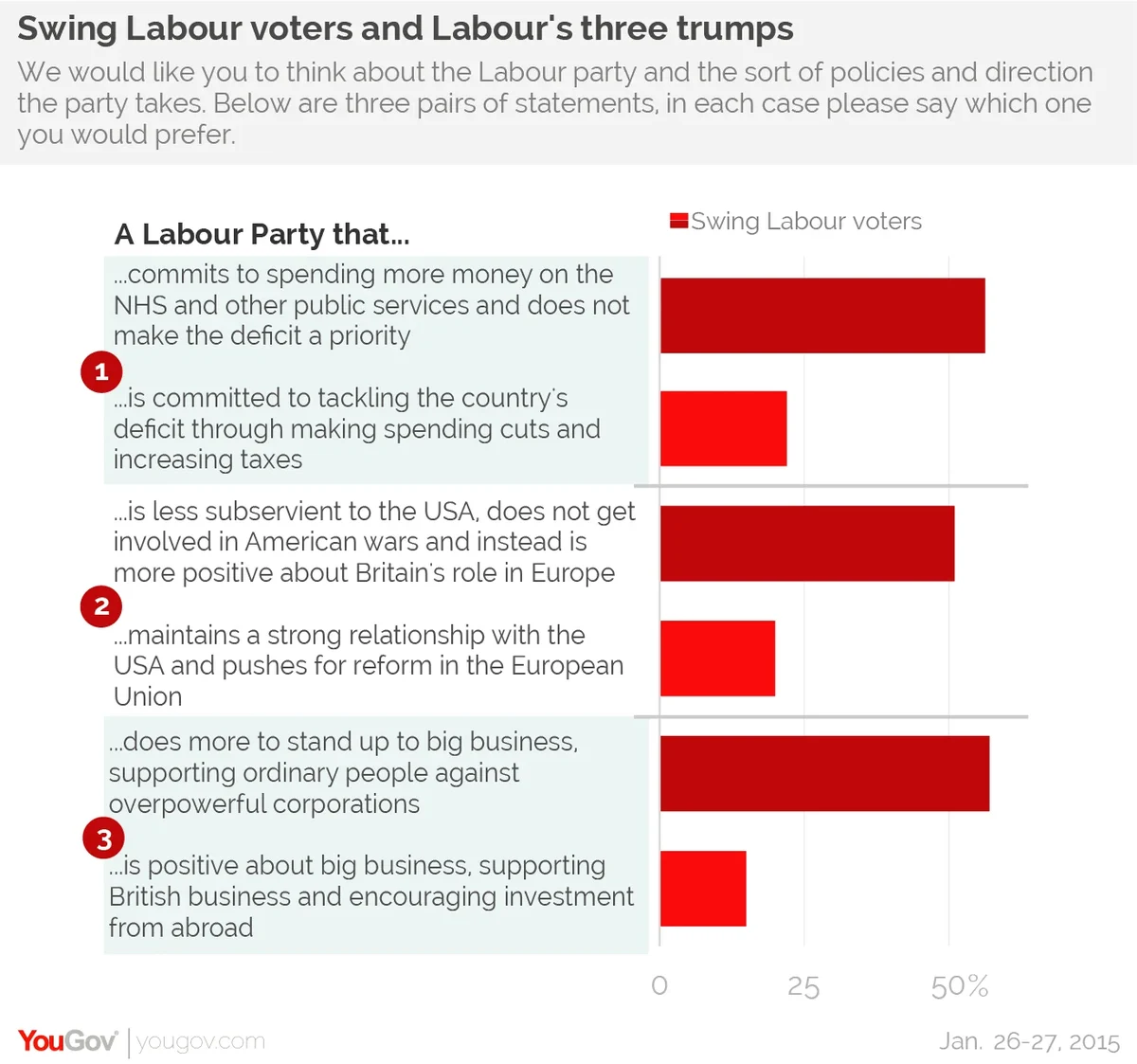Conventional wisdom says Labour should aim for the centre ahead of the general election. New polling suggests this might not be the winning approach
Our polling, taken at face value, shows that Labour would do better to go nap on its instincts: anti-austerity (spending more not less on public services), anti-war (especially turning our backs on American excursions) and anti-big business (and in particular global finance). The charts below all show overwhelming majorities preferring a leftist Labour Party than a Blairite one. Among swing voters, the majorities are huge (it's worth remembering that swing voters these days are less those moving between Labour and the Conservatives and more those moving off to their respective wings).
But there are two bits of conventional wisdom in the world of political campaigning that should give us pause. First, people often toy with radicalism but shrink back from it when the moment of decision draws close. They may hate bankers, but they want well-functioning banks and they do worry about messing too much with the system. The second bit of wisdom is that parties in the longer run don't score points for indulging their instincts. Tories talking about immigration and Labour getting angry about filthy capitalists reinforces the public's negative views of them. Blair did, after all, succeed exactly because he sounded safe to Conservative voters, and Cameron appealed most when he was hugging trees and hoodies.
I'm sure all that is true. But it doesn't completely negate my sense that the electorate is indeed polarising, that people are not as attracted to the mushy centre as they were five years ago. That mushy centre did not turn out to be so safe for large sections of the population. Britain is not Greece, but large parts of Britain feel let down by the establishment. There may indeed be enough votes in a more egalitarian, big government non-intervensionist Labour offer. They don't want 'Old Labour', it's a busted brand, but they do want many of those policies. Miliband is offering neither 'New Labour' nor traditional red Labour. He's surely not capable of the first, but he does at least have genuine feeling for the second.
Our poll suggests that there are three trump cards that might deliver them a victory to Labour in the general election. Up until now they haven't played them but by majorities of two to one voters are supporting of them, and one group that looks particularly susceptible is "swing Labour voters" – those who say they have not completely made up their minds on who to vote for and have not ruled out voting for Labour.

The first trump is a strong anti-austerity message. Although most of the establishment pushes the case for prioritising debt-reduction, voters appear not to share that priority. Labour's current position is that it will continue Tory austerity with cuts of its own, only slightly less deep and a little more slowly. But the electorate is sick of cuts and wants to hear that spending on public services will increase, by 43 to 19. Swing labour voters hold the view much more strongly, by 57 to 15.
The second trump is to stay out of American wars. Involvement in military excursions remains deeply unpopular. Only 26% of all voters and 20% of swing voters want Labour's focus to be on maintaining strong ties with the United States rather than Europe. Though there has been recent grudging support for surgical strikes on Isis, sending in troops loses votes.
The third trump is to stand up more aggressively to big business. 49% of all voters and 56% of swing Labour voters want Labour to take a harder line, while just 23% and 22% prefer a more pro-business tack. In this area, Labour has scored some limited success with its policy of freezing utility prices, but there is room for much more. Britain is a more egalitarian country than most commentators seem to credit.
The figures in our poll are powerful. It's as if the electorate are saying: give us some meat, we're sick of austerity and we don't want politicians battening down the hatches for the next three months. Admittedly, Britain is not Greece, and the radicalism that won a surprise victory over the weekend will not work here. But something in the electoral arithmetic has changed, which may embolden campaigners to take some risks: in the past, you needed 40% to win an election. Today, 35% is probably enough. One thing is for sure: while not many voters are swinging between Labour and Tory, these policies would win back most of the Greens, hold on to most of the LibDems who have moved across to Miliband, and even attract a few anti-establishment Ukippers.
An edited version of this article appeared in the Times Red Box.






